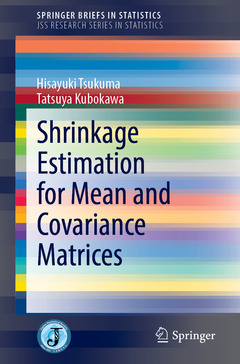Description
Shrinkage Estimation for Mean and Covariance Matrices, 1st ed. 2020
JSS Research Series in Statistics Series
Authors: Tsukuma Hisayuki, Kubokawa Tatsuya
Language: English
Subject for Shrinkage Estimation for Mean and Covariance Matrices:
63.29 €
In Print (Delivery period: 15 days).
Add to cartSupport: Print on demand
Description
/li>Contents
/li>Biography
/li>Comment
/li>
This book provides a self-contained introduction to shrinkage estimation for matrix-variate normal distribution models. More specifically, it presents recent techniques and results in estimation of mean and covariance matrices with a high-dimensional setting that implies singularity of the sample covariance matrix. Such high-dimensional models can be analyzed by using the same arguments as for low-dimensional models, thus yielding a unified approach to both high- and low-dimensional shrinkage estimations. The unified shrinkage approach not only integrates modern and classical shrinkage estimation, but is also required for further development of the field. Beginning with the notion of decision-theoretic estimation, this book explains matrix theory, group invariance, and other mathematical tools for finding better estimators. It also includes examples of shrinkage estimators for improving standard estimators, such as least squares, maximum likelihood, and minimum risk invariantestimators, and discusses the historical background and related topics in decision-theoretic estimation of parameter matrices. This book is useful for researchers and graduate students in various fields requiring data analysis skills as well as in mathematical statistics.




